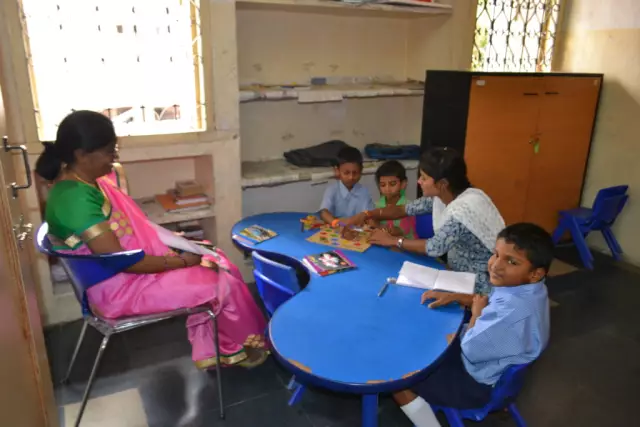- Author Rachel Wainwright wainwright@abchealthonline.com.
- Public 2023-12-15 07:39.
- Last modified 2025-11-02 20:14.
Family education of children

The family is the main institution of human education. Family upbringing of children is a system of upbringing and educational processes governed by certain traditions and norms adopted in the conditions of a single family, and implemented by the efforts of all family members. The main goal of family education is the formation of a moral, intellectually developed personality, prepared for life in modern society. The family is for the child a natural environment of existence, which differs from other groups with which he will interact in later life. What is the role of family and family traditions in raising children? How does family education differ from educational processes implemented by other educational and educational institutions?
Family education of children: general principles and provisions
Family upbringing of children is a set of methods and measures taken by family members consistently and regularly in order to form the child's social and personal norms of behavior, moral and ethical values and foundations, general civil and universal ideals.
Family upbringing of children is one of the main mechanisms for preparing an individual for integration into modern society. It is in the family environment that the child receives the first ideas about the interaction of the individual and society, about the interests and priorities, about the benefits of both parties.
The nature of family education is determined by the following factors:
- Physical and mental health of family members;
- Heredity;
- The material and economic status of the family;
- Family social status;
- Way of life;
- Number of family members;
- Accommodations;
- Relationships between family members;
- Cultural, moral, moral potential of the family.
The main tasks of family education of children are:
- Creation of the most favorable conditions for the mental, physical and mental development of the child;
- Transfer of life experience and knowledge, value systems;
- Teaching children basic skills and abilities, instilling interest in knowledge and cognition;
- Fostering self-esteem, self-worth.
The main methods of implementing family education of children are:
- Persuasion (conversations, advice, suggestion);
- Personal example;
- Encouragement and development in the child of a sense of satisfaction with their successes;
- Punishment (limiting the child's pleasures, but without using physical measures).
The basic principles of family education of children are reduced to the following provisions:
- Recognition of the child as an equal member of the family, respect for his personality, interests, needs;
- Perception of your child as he is, without making excessive demands on his activities and achievements;
- Creation of a favorable, emotionally comfortable, trusting atmosphere for establishing contact with a child;
- Providing the necessary assistance to the child, while avoiding overprotection;
- Consistency in their actions and requirements, both in the educational process and in everyday life;
- Building educational strategies taking into account the age, gender and personality of the child.
The child takes the family, its traditions and norms accepted in the family circle for granted. The family for the baby is the first educational institution, which is the most authoritative, unlike each subsequent one. And also that natural filter, which has a direct impact on the formation of personality. So, in the first years of a child's life, parents determine the main circle of his interests, his circle of contacts, his place of residence and points of contact with society. It is in the atmosphere of the family that the child learns the first experience of intergender relations (mother and father), the experience of intergenerational relations (fathers and children). Children subconsciously copy the behavior of adults, accepting their behavior patterns as true and the only correct ones. In later life, it will be extremely difficult for a child to understand why he does not develop relationships in a team, with friends,personal relationships with the opposite sex.
Family education of preschool children
Preschool children are the most susceptible to situations, events taking place in their family. This is explained by the main feature of family education of children, which is built on feelings and emotions, and not on comprehending new experience, gaining new knowledge (which is implemented in kindergartens, schools, and other educational institutions). The basis of successful family education of preschool children is the love of parents for the child, which should be manifested in words, attitudes, actions, feelings of the child, and family atmosphere. A child who does not receive parental attention and love, with all his might tries to attract the missing attention by various actions, disobedience, whims, isolation. The main mistake of parents in this case is punishing the child without revealing the essence of the problem of such behavior. Many parents prefer to solve problems with children with the involvement of teachers and psychologists, although the child at this moment simply needs parental affection and support. The main mistakes of family education of preschool children include:
- Recognition of material wealth as priority over spiritual and moral values;
- Low cultural, moral and spiritual potential of parents, their immoral, immoral behavior;
- Authoritarianism and impunity, as well as excessive physical punishment of children;
- Heavy psychological atmosphere in the family.
The role of family traditions in raising children

Family traditions are a set of accepted and observed norms, rules, customs and attitudes that determine the behavior of each family member individually, as well as the family in general, passed down from generation to generation. Family traditions play a primary role in the upbringing of children. This is precisely the factor that distinguishes the family from other groups with which the child will interact. Family traditions strengthen family ties, develop feelings of duty and responsibility, pride in the family and concerns for its integrity and unity. With the fall in the value of the institution of the family in modern society, family traditions are a tool for strengthening the family.
Compliance with family traditions brings order to a person's life. Traditions unite generations, allowing children in the process of education to better assimilate the mechanisms of intergenerational relationships. Compliance with traditions instills in the child feelings of love, affection, respect. Leisure activities on weekends, shared Sunday dinners, celebrations of important events not only strengthen family ties and values, but also create a positive family atmosphere.
Found a mistake in the text? Select it and press Ctrl + Enter.






